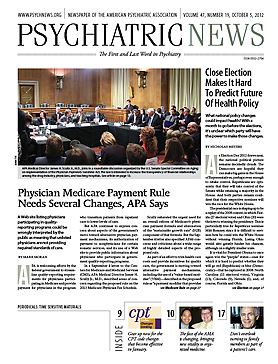I am writing this in early September, as the U.S. prepares for two months of the fiercest battles of the campaign season. We will be bombarded with ads from candidates at every level, and billions of dollars will fuel our political engine. Along the way, you will hear complaints about the influence of wealthy “special interests” in the election process. What you won’t hear is who those “special interests” are. In some cases, it turns out that “they” are actually you and me.
Joining APA brings you discounts and tangible benefits, but the real value is the advocacy the Association does for you and your patients.
I, along with other resident leaders, have been on the front lines of that work, both in my state legislature and in Congress during APA’s annual Advocacy Day. As a medical student, I did something similar through the AMA and its state societies.
Over the years, I have found that legislators come in three basic flavors. There are the all-too-rare friends—people who have some connection to mental health, “get it” on all our issues, and will speak loudly for us even behind closed doors.
Next, there are those who disagree with our specific proposals, but who want to hear from psychiatrists and who genuinely try to listen when we speak. And finally, there are lawmakers whose ears are closed before we walk through their doors. It doesn’t matter whether we show up with spreadsheets of data or heart-wrenching stories; they consider psychiatrists (and sometimes, all doctors) to be the source of all that is broken in health care, and nothing we say can change that.
When that third type of legislator sits on important committees, has budget-writing authority, or otherwise gets his or her hands on the levers of power, our patients suffer, and so do we. Worse yet, because they are so hostile, there is only one option for changing their vote: finding a way to remove them from office and replace them with someone from the first group (or at least the second).
At the same time, those who have supported us may face rocky elections. Their work to expand access to care is condemned as fiscal irresponsibility or an assault on civil liberties. Whether in a small-district House race or one for a Senate seat, we cannot afford to lose any of our allies. And so, for both friends and opponents, psychiatrists have to play an active part in elections and take our place as a “special interest.”
But how do we do that? We are all busy, and residents doubly so. Knowing how your members of Congress acted on important issues is difficult, except for a few high-profile votes.
Knowing what they do and say behind closed doors, and whether they truly support your ideals, is almost impossible. Or at least it is if you try to go it alone. That is why you pay part of your APA dues for advocacy work—so that APA leaders and staff can go where you can’t, ferret out vital information, and use the collective power of your dues to better serve your needs and those of your patients.
When it comes to elections rather than legislative actions, there’s another organization ready to influence legislation that will affect psychiatric practice and patient care—APA’s political action committee (APAPAC). Just as APA monitors legislation, our PAC monitors the legislators themselves. When our leaders spread out across Capitol Hill for Advocacy Day, APAPAC tracks who listened and who gave us the cold shoulder. Then, during election season, APAPAC uses members’ contributions to help the campaigns of candidates most likely to hear and support our ideas.
Is this money influencing politics? Absolutely. It’s the money we earn taking care of our patients, influencing Congress to focus on building a better health system, and it is our joined efforts acting as a powerful force for change.
Joining the PAC means making an extra contribution above your APA dues, and none of us is feeling wealthy these days. Nonetheless, even $50 invested now could mean thousands of fewer hours spent battling insurers and the legal system over your career. I’ve found that to be a worthwhile investment, and this election season, I hope you’ll join me by making a contribution to APAPAC.
Alik Widge, M.D., Ph.D., is APA’s member-in-training trustee and a PGY-4 resident at the University of Washington.

